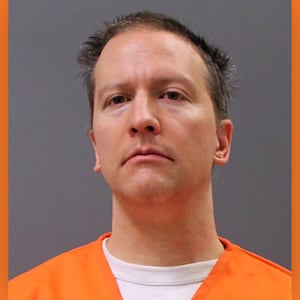Looming over a busy interstate in Richmond, Virginia, is a billboard with an ominous message: “The safety of our city is in jeopardy.”
Public safety, the billboard blares out in giant red letters, is in “crisis.”
The culprit: a group that claims to represent nearly half the sworn officers in the state capital and functions much like a police union—right down to the inflammatory language.
Brendan Leavy, president of the Richmond Coalition of Police, told The Daily Beast his organization erected the highway sign on June 2—and then another one, right in front of police headquarters, this past Monday—because officers are tired of the city ignoring their pleas for competitive wages. He argued that citizens “deserve to know” about a mass exodus of officers that risks imperiling their safety.
“The city is in a crisis due to poor staffing and pay,” Leavy told The Daily Beast.
He’s coupled the billboards with statements to the media about the vacancies plaguing the department. According to the Richmond Police Department, there are currently 74 open positions.
Vacancies, early retirements, and officers fleeing metro areas are issues departments across the country face, according to a forthcoming report from the Police Executive Research Forum recently outlined in The New York Times. A survey of nearly 200 police departments found that retirements were up by 45 percent, and resignations by 18 percent, between April 2020 and April 2021, the paper reported.
But in their demand for solidarity in the face of a violent crime surge across the country, members of the police department—including Leavy, who is a detective—have angered community leaders and local officials, particularly those representing Richmond’s predominantly Black community. To them, the billboards are just a new way of asking for more of the same after a year of unprecedented protests over police violence.
“There’s always some propaganda going on when it comes to the police and their budget,” Lawrence West, the founder of BLMRVA, a local Black Lives Matter chapter in Richmond, told The Daily Beast.
Since last summer, his organization has been involved in protests for police reforms that sprung up after the murder of George Floyd. And protesters in Richmond appear to have accomplished quite a lot.
<p><strong><em>Do you know something we should about police or protests over police violence? Email Andrew.Boryga@thedailybeast.com or reach him securely via Signal at 978-464-1291.</strong></em></p>
In short order, the city saw its white police chief pushed out by the mayor, an interim Black chief leave after just 11 days of service, and a new chief, Gerald Smith, who is also Black, get handpicked by the mayor to lead the department of nearly 800 officers.
The city has also pledged to establish a civilian review board, revamp use of force policies, and utilize mental-health professionals during certain police calls. In the midst of this, Confederate statues in the city have been torn down, and West said he and his organization were currently occupying the space around one of the last remaining statues on Monument Avenue, honoring Robert E. Lee.
Those early victories notwithstanding, if there is a problem of a lack of the police in the city, West said, it’s one he hasn’t encountered personally.
“We see police presence every single day,” he said. “We’re wondering sometimes why in the world are they walking around and all around Monument Avenue if we’re not doing anything. Maybe the police need to look at their budget and what they’re actually allocating the money to.”
Last month, Richmond’s mayor, Levar Stoney, and the City Council approved a nearly $800 million budget that includes a 3.25 percent raise for city employees, including police officers, according to the Richmond Times-Dispatch. The budget, which also includes funds for a new civilian-review board and pay increases for public defenders, came after city leaders repeatedly said there were funding challenges due to the pandemic.
Leavy said the proposal fell far short of the $6 million raise plan his group lobbied the city for. He also said the new plan, which goes into effect in October, is structured in a way that would result in many officers seeing their salary remain unchanged—and make opportunities in higher paying jurisdictions nearby continue to be far more appealing.
Mayor Stoney declined to comment for this story.
But Michael Jones, a Black city councilman in Richmond, said the argument that Leavy and his group have been making is disingenuous. After all, he said, public officials across the city, as well as teachers, have always made less than those in other larger and wealthier counties nearby who don’t have nearly the same poverty and crime struggles Richmond does.
“They knew what the pay rate was when they came in,” said Jones of officers. “This disparity wasn’t new. If you want to leave to go somewhere else because you’re going to get more money, that is your choice. If you don’t wanna serve here, don’t.”
Dana Schrad, executive director of the Virginia Association of Chiefs of Police and Foundation, agreed that the pay disparities between Richmond and nearby Henrico County or Chesterfield County have always been real. But she said the exodus of Richmond officers was likely also due to the fact that the city was a focal point of protests over the summer—and because violent crime rates have increased, as they have in many metro areas around the country.
Schrad told the Daily Beast that counties and localities with lower crime rates and higher pay are now more “attractive to officers who are emotionally spent after the past year of demonstrations, ridicule, and legislative reforms that threaten their personal safety and their employment.”
Michael Rollston, a retired Richmond Police Department Lieutenant, agreed, going so far as to say he found the billboards commendable. He retired from the department in 2000, but said that although the pay disparity has always been around, it’s never been thoroughly addressed.
The billboards, he told The Daily Beast, finally put the issue front and center.
“If you don’t have controversy, if you don’t put it out there blatantly, I’m pretty sure Chief Smith and the administration and the police department as well as the city—they’re basically going to ignore you,” he said. “You have to make a statement.”
On Tuesday, Chief Smith responded directly to that statement in a press conference, calling the billboards “a problem.”
While he did admit the department to be understaffed, he pushed back on suggestions that the city was any less safe or that violent crime was skyrocketing. According to city data, homicides from January through May are up 20 percent and robberies are up 41 percent year on year. But Smith said those numbers are only inflated when compared to 2020 numbers, which he said were lower across the board because of the pandemic and lockdowns.
“We are doing quite well compared to previous years, except for 2020,” he said. Chief Smith did not respond to a request for comment for this story.
But some Richmond residents are deeply hostile to the idea of more money for cops—and for personal reasons.
In May 2018, Princess Blanding’s 24-year old brother Marcus-David Peters, who was Black, was shot and killed by a Richmond officer while unarmed and experiencing a mental-health crisis. Two reviews by prosecutors cleared the officer of wrongdoing, but Peters’ name became a frequent refrain during protests over the summer in 2020, and the grassy space near Robert E. Lee’s statute was renamed Marcus-David Peters Circle in his honor.
Since his death, Blanding—a teacher and an independent candidate for Governor of Virginia—said that like others who support the Defund the Police movement nationwide, she has been advocating for a reduction in funds to flow toward raises for police. Instead, she believes that money should go to alternative programs that could reduce crime by addressing poverty, access to medical care, and affordable housing. She has also advocated for a civilian review board in the city, which is in the process of being established, as well as a change to how police respond to mental health crises. A state bill that makes such a change and is named for her brother was recently signed into law by Governor Ralph Northam.
Blanding conceded that residents in Richmond have been experiencing crime and feeling unsafe. But she said those feelings are due in part to the way police treat Black residents—as epitomized in tragedies like the death of her brother and the use of force against protesters over the summer.
“There is major distrust in many of our communities,” she said.
In his press conference, Chief Smith admitted that relations between the public and the police department had room to improve, and touted initiatives like community walkthroughs, advisory committees, and liaisons for specific communities to help heal tensions. He said that in addition to economic strains caused by the pandemic and access to guns, he believes crime is going up because members of the community are hesitant to call the police.
“That is on us to increase our trust and legitimacy in the community,” he said.
But with the rhetoric escalating, it was hard to imagine that rift healing any time soon.
Jones, the councilman, said that if members of the police department and the group representing them feel like they aren’t supported by the community, their billboards putting the city under notice won’t do them any favors.
“If it’s support that they want, in my opinion, this doesn’t help,” he said. “They’re trying to put the whole city on blast. No. Put the mayor on blast. Hell, put me on blast as a council member. Don’t put the fucking city on blast.”






